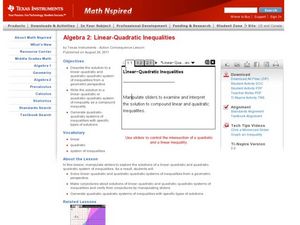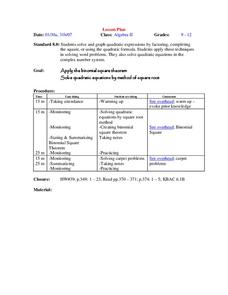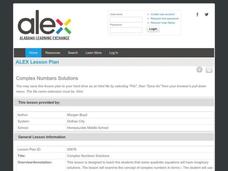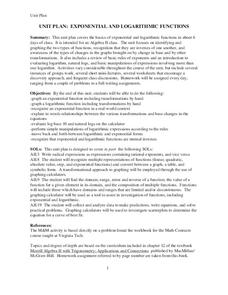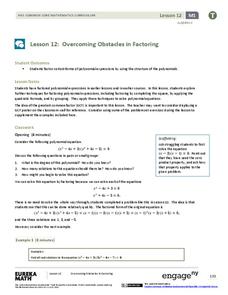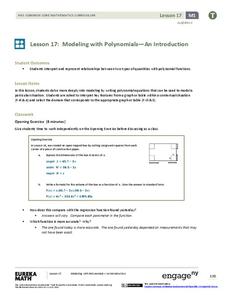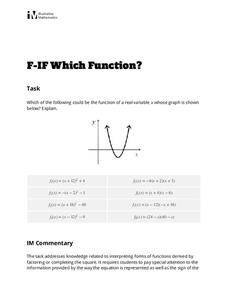Curated OER
Completing the Square Algebraically
Using TI-Nspire, scholars rewrite quadratic expressions by completing the square. They change the equation into vertex form. By the end of this lesson, they should be able to change any quadratic equation into vertex form.
Curated OER
Linear-Quadratic Inequalities
High schoolers graph linear and quadratic functions. In this algebra lesson, students create graph with specific coordinate points. They use the Ti to visualise and differentiate between the two functions.
Curated OER
Quadratic Equations and Binomial Square Theorem
Students factor quadratic equations. In this algebra lesson, students apply the binomial square theorem to solve quadratics. They complete the square and use the complex number system to solve for the roots.
Alabama Learning Exchange
Complex Numbers Solutions
Complex doesn't have to mean harder! Learners experiment with online software to determine the quadratic equations with complex solutions. They use the quadratic formula to solve equations with both real and complex solutions.
Virginia Tech
Unit Plan: Exponential and Logarithmic Functions
A six-day unit for algebra II on exponential and logarithmic functions builds upon Chapter 12 of Merrill Algebra II with Trigonometry; Applications and Connections. The text provides assistance in the depth of instruction...
Curated OER
The Quadratic Formula
Students solve quadratic function by completing the square. In this algebra lesson, students use the quadratic formula to factor quadratics and find the roots. They graph the parabola and identify its properties.
Curated OER
The Football and Braking Distance: Model Data with Quadratic Functions
Students engage in a lesson plan that is about the concept of data analysis with the use of quadratics. They use a Precalculus text in order to give guidance for independent practice and to serve as a source for the teacher to use. The...
EngageNY
Overcoming Obstacles in Factoring
What do you do when factoring doesn't work? Learners complete the square when faced with quadratic expression that don't factor traditionally. They then use factoring by grouping to solve polynomial equations.
EngageNY
Linear Systems in Three Variables
Put all that algebra learning to use! Using algebraic strategies, learners solve three-variable systems. They then use the three-variable systems to write a quadratic equation given three points on the parabola.
Howard County Schools
Building a Playground
Scholars crave practical application. Let them use the different models of a quadratic function to plan the size and shape of a school playground. They convert between the different forms and maximize area.
EngageNY
Putting It All Together
Shuffle 'em up and deal! Learners practice operations with polynomials using cards they pass around the room. The activity works with pairs or individuals, so it offers great flexibility. This is the fifth installment in a series of 42...
EngageNY
Modeling with Polynomials—An Introduction (part 2)
Linear, quadratic, and now cubic functions can model real-life patterns. High schoolers create cubic regression equations to model different scenarios. They then use the regression equations to make predictions.
Illustrative Mathematics
Which Function?
Learners are given a graph of a parabola on a coordinate system, but intercepts and vertex are not labeled. The task is to analyze eight given quadratic functions and determine which ones might possibly be represented by the graph. The...
Illustrative Mathematics
Springboard Dive
Dive into this problem that illustrates a real-world application of the quadratic formula. Learners are given an equation that represents the height of a diver above the water t seconds after leaving the springboard. The task is to...
Curated OER
Quadratic Equations
Tenth graders review algebraic methods of solving quadratic equations. Students discuss several methods of solving quadratic equations. They practice factoring and finding the roots of an equation for solving. A calculator is used to...
Curated OER
The Factor Connection
Pupils investigate the connection between factors, zeros, and graphs of quadratic functions. The lesson plan requires the TI-nspire handheld.
Curated OER
SkyHighScrapers
Students investigate quadratic functions. In this Algebra I/Algebra II lesson, students determine the equation of a quadratic function that closely matches a set of points. Students investigate the necessary information that...
Curated OER
Mirror Curvature
Students investigate parabolas as the shape of a telescopic mirror. In this Algebra I/Algebra II lesson, students explore the relationship between the coefficients of a quadratic function and the shape and position of the parabolic...
Curated OER
Telescope #2
Students investigate parabolas as the shape of a telescopic lens. In this Algebra I/Algebra II lesson, students explore the relationship between the coefficients of a quadratic function and the shape and position of the parabolic...
Curated OER
Ellipses (Part 1)
Students work with Ellipses in Algebra II. For this algebra lesson, students solve an equation with a radical expression. They graph ellipses and write an equation for them.
Curated OER
Storefront Signs
Learners practice finding the areas and patterns within a square and explore the concept of quadratic functions. They observe and record the area values in a table, plot a graph of Area versus Distance and complete a variety of student...
Curated OER
Factoring
High Schoolers engage in a study of quadratic functions and focus upon the finding of equivalence and its connection between functions. They also practice factoring using the FOIL method while manipulating the equation. The instructional...
Curated OER
Transforming Parabolas
In this Algebra II worksheet, 11th graders examine the affects of changing h and k in the vertex form of the parabola. The three page worksheet provides explanation of topic, worked examples, and four practice problems. ...
EngageNY
Choosing a Model
There's a function for that! Scholars examine real-world situations to determine which type of function would best model the data in the 23rd installment of a 35-part module. It involves considering the nature of the data in addition to...



